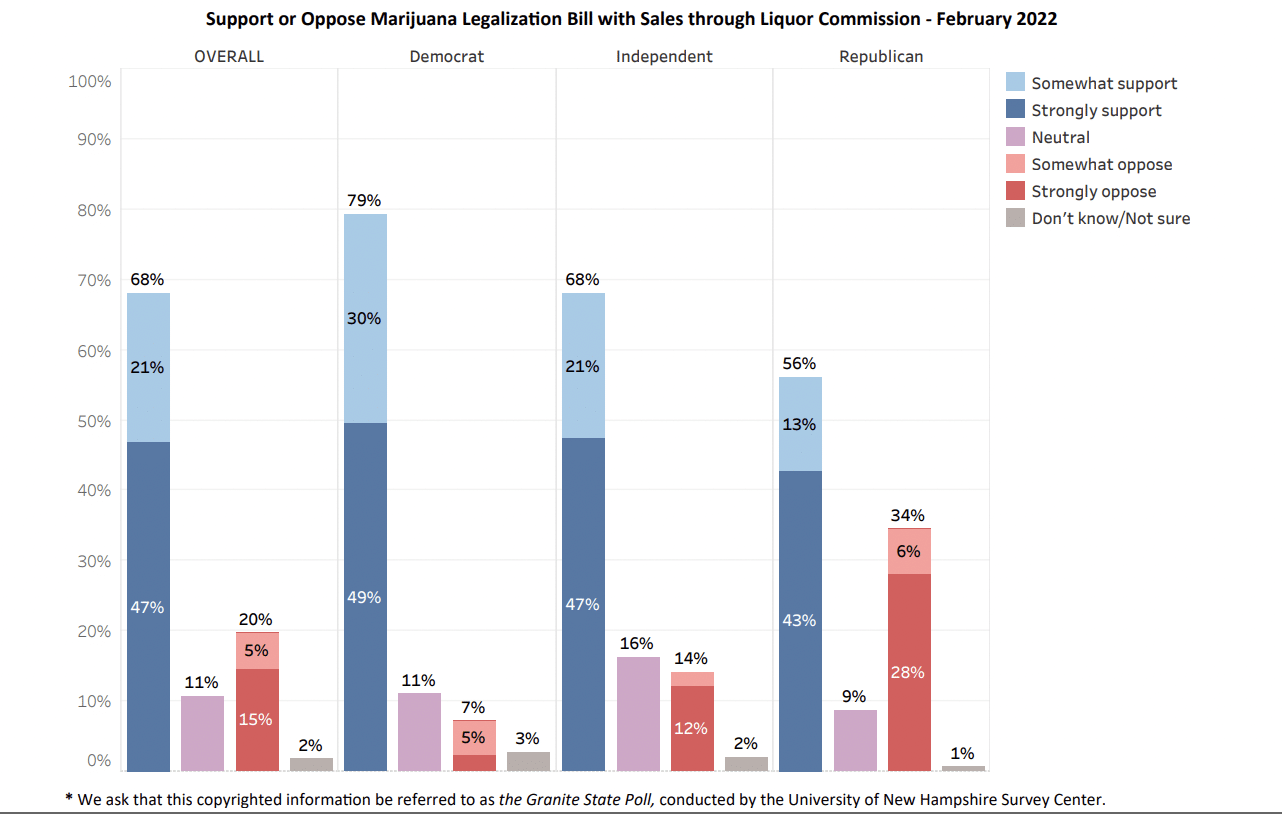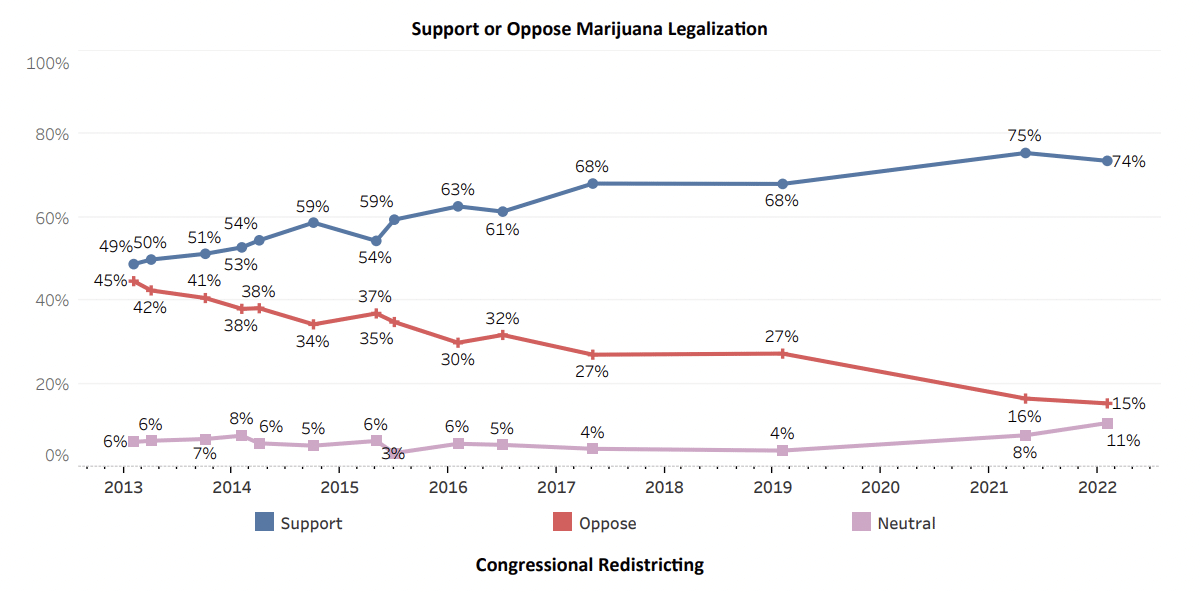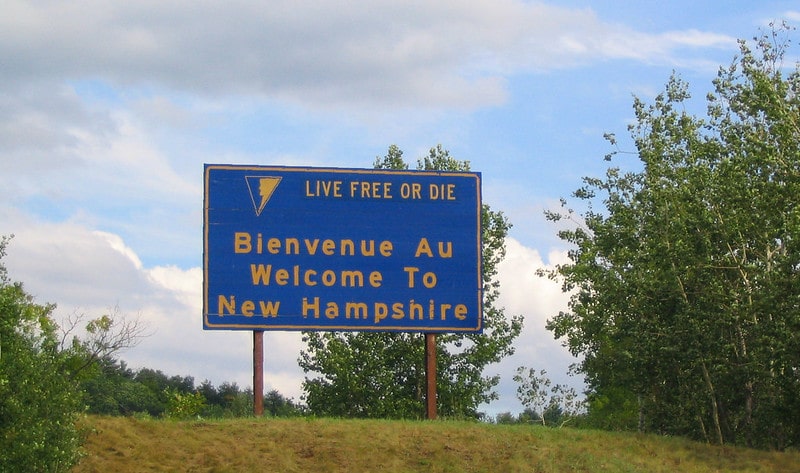Nearly three in four New Hampshire voters support legalizing marijuana, according to a new poll. And bipartisan majorities also say they’re in favor of conducting cannabis sales through a state-run model as would be the case under a bill that recently passed the House of Representatives.
The Granite State Poll, published by the University of New Hampshire (UNH) on February 25, found that 74 percent of residents in the state feel that prohibition should end. In a separate question, 68 percent said they support a bill that passed the House this month to have the state Liquor Commission exclusively conduct sales—a proposal that has raised some concerns among advocates and stakeholders.
While bipartisan majorities said they favor the state-run legalization proposal, it should be noted that respondents were not given an alternative regulatory model.
Seventy-nine percent of Democrats, 68 percent of independents and 56 percent of Republicans said they back the unique reform approach.

Graphic via UNH.
Meanwhile, support for legalization overall has grown demonstrably in the state over the past decade, increasing by 25 percentage points since UNH started polling residents on the issue in 2013.
 Graphic via UNH.
Graphic via UNH.
Just 15 percent of Granite Staters now oppose legalizing cannabis.
But while bipartisan majorities said they favor the state-run legalization proposal, it should be noted that respondents were not given an alternative regulatory model in the new poll. And when asked about legalization through a traditional, private retail model last year, 78 percent said they favor that approach.
Bipartisan Support for NH Marijuana Legislation; Most Consider Legislature’s Redistricting Maps Unfair#NHPolitics https://t.co/GGDEp7DWHO
— UNH Survey Center (@UNHSurveyCenter) February 25, 2022
What both surveys show, however, is that New Hampshire residents are ready to let adults legally purchase cannabis in one way or another. The latest poll found majority support for basic reform across all demographics, including age, gender and education level.
“This poll confirms, once again, that cannabis legalization is very popular with New Hampshire residents,” Matt Simon, director of public and government relations for Prime Alternative Treatment Centers of NH, told Marijuana Moment. “It also tells us something new: The liquor monopoly model is substantially (10 percent) less popular than the idea of allowing sales by licensed retail outlets. It will be interesting to see how policymakers choose to interpret these numbers.”
NEW UNH POLL:
74% of Granite Staters support cannabis legalization.
68% support the bill that would require sales to be conducted in state-run stores (this is 10% lower than the 78%, in a previous poll, who supported having cannabis sold at licensed retail outlets). #NHPolitics https://t.co/wknGB37MvL— Matt Simon (@MattSimonSez) February 25, 2022
The new poll involved interviews with 1,081 New Hampshire residents from February 18-22. The margin of error was +/-3.0 percentage points.
Adults would be able to purchase cannabis from dispensaries operated by the New Hampshire Liquor Commission. The could possess up to four ounces, but home cultivation would continue to be criminalized.
The state-centered legislation from Rep. Daryl Abbas (R) cleared the chamber in a 235-119 vote this month, despite facing resistance from people on both sides of the broader cannabis debate. The action comes about a month after the House passed a separate, non-commercial legalization bill that’s also generated criticism.
Under the proposal, which must still go before the House Finance Committee because of its fiscal components and then receive another floor vote before advancing to the Senate, adults 21 and older would be able to purchase cannabis from state-run dispensaries operated by the New Hampshire Liquor Commission. The could possess up to four ounces, but home cultivation would continue to be criminalized—one of the chief complaints from activists.
State regulators would have until October 1 to adopt rules for “the registration and regulation of cannabis establishments and cannabis cultivation facilities.” They would then have another two months to create regulations on issues like advertising, labeling, civil fines, security and THC limits.
Some advocates had hoped that the legislation would be defeated so that lawmakers could consider alternative reform proposals to create a legal marijuana market that more closely aligns with those established in other states.
Photograph by Ken Lund via Flickr/Creative Commons 2.0
This story was originally published by Marijuana Moment, which tracks the politics and policy of cannabis and drugs. Follow Marijuana Moment on Twitter and Facebook, and sign up for its newsletter.




